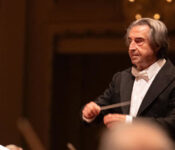Review: Officially, conductor Riccardo Muti holds the distinction of music director emeritus for life with the Chicago Symphony Orchestra. But after the 83-year-old maestro’s two-week season debut concerts at Orchestra Hall, it seems more apt to acknowledge him as the band’s artistic patriarch. When Muti’s on the podium, the CSO rises to its proper level. It glistens.
Read the full story »‘Pipeline’ at Victory Gardens: As a black teen drifts, mother strives to find meeting ground

Review: Omari is 16, maybe 17 years old and he’s in serious trouble. He’s black, a bright kid, from good people. They send O – everybody calls him O – to a private school. But the boy is deeply angry, and now he’s facing expulsion from school, and maybe much worse, for assaulting a teacher. This the perilous crux of Dominique Morisseau’s play “Pipeline,” on gripping display at Victory Gardens Theater. ★★★★
‘Cardboard Piano’ at TimeLine: Kids in love, and the long, life-altering echo of homophobia
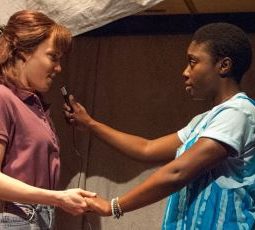
Review: There is one great scene and another that’s at least charming in Hansol Jung’s play “Cardboard Piano,” now occupying the stage at TimeLine Theatre. But all told, this dramatic parable about the intolerance of homosexuality in Uganda limps from adolescent fantasy to a second act that is more contrived than compelling. ★★
Nina Stemme, Lyric’s high-powered Elektra, recalls her cosmic trek from the world of Mimi
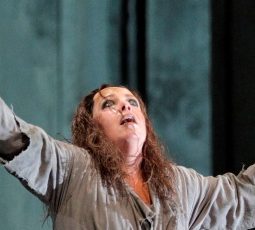
Interview: By this point in soprano Nina Stemme’s operatic journey, the high-intensity role of Richard Strauss’ “Elektra” has emerged as a signature piece. Indeed, the Swedish singer and reigning Wagnerian soprano, who currently performs the distraught and vengeful Elektra in her debut with the Lyric Opera of Chicago, all but owns the part. She is the foremost Elektra in the world today, and she embraces the staggeringly difficult role as “the greatest joy” to sing.
Chicago theater mid-season preview, Part 3: Steppenwolf, Lookingglass, Chicago Shakes
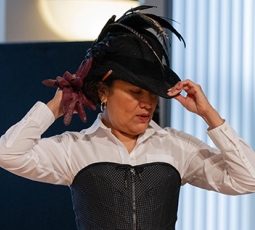
Preview: The mid-winter is far from bleak under Chicago’s theater marquees. Steppenwolf offers Lucas Hnath’s “A Doll’s House, Part 2,” a sort of what-if sequel to Ibsen’s play. Lookingglass runs out the premiere of Kareem Bandealy’s ‘Act(s) of God,” a cosmic guess-who’s-coming-to-dinner. And Chicago Shakespeare revisits the Bard’s melancholy prince – ever perched on the existential fence between being and nothingness.
Strauss’ ‘Elektra’ at Lyric Opera: Nina Stemme triumphs as vengeful princess with a ready ax

Review: The great power of Richard Strauss’ “Elektra” lies in the transmogrification of a timeless tragedy through harrowing vocal music reinforced by an orchestral score so vivid, so nearly verbal, that it might stand alone as a symphonic drama. The magnificence of Lyric Opera of Chicago’s current production resides in the depth of its humanity – that depth sounded by tremendous vocal performances and orchestral playing, under Donald Runnicles, that is absolutely graphic. ★★★★
‘Nina Simone: Four Women’ at Northlight: Stripes of suffering, stained in shades of black
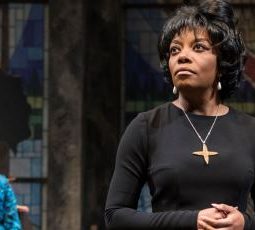
Review: If you’re a serious theater buff, go directly to the Northlight schedule of performances for Christina Ham’s “Nina Simone: Four Women,” and find a night that works for you. This disarming play-with-song about the great jazz and blues singer’s conversion to black activist – but more than that, about black women in their skin – is simply not to be missed. ★★★★★
‘How to Catch Creation’ at Goodman: Babies and art and other hints that mankind was here

Review: Griffin wants to have a baby. Problem is, he doesn’t even have a girlfriend. He would adopt, but that raises another problem: his criminal record. Well, not strictly a criminal record, but he did a good stretch of time. Griffin’s conundrum is the core, the tease, the red herring of Christina Anderson’s delightful and touching new play “How to Catch Creation,” now in its world premiere run at Goodman Theatre. ★★★★
‘Photograph 51’ at Court: Isolated among men, one visionary woman fixes her focus on DNA
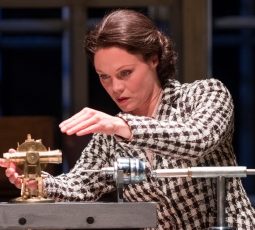
Review: Anna Ziegler’s play “Photograph 51,” now precisely imaged on stage at Court Theatre, is a high-intensity portrait of Rosalind Franklin, the British scientist who played a key role in discovering the double-helix structure of DNA – but was omitted from the picture when the men around her received the Nobel Prize for that landmark breakthrough. It is, alas, a preachy play, narrow and agenda-driven. ★★★
In CSO’s new season, Muti and galaxy of stars offer a prodigious tribute to Beethoven at 250
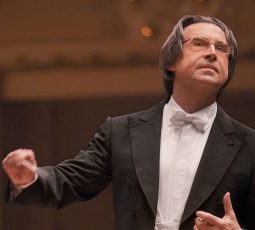
Report: A monumental tribute to the 250th anniversary of Beethoven’s birth highlights the Chicago Symphony Orchestra’s 2019-20 season, its 10th under the stewardship of music director Riccardo Muti. In a season-long Beethoven immersion, Muti will conduct all nine symphonies and six different pianists will make their way collectively through the 32 sonatas. Muti will also preside over four world and U.S. premieres.
‘Red Rex’ at Steep: When theater stages local story, fantasy lifts curtain on one man’s pain
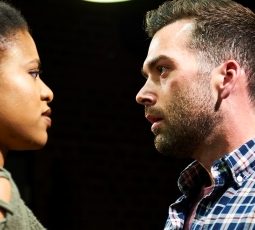
Review: The latest installment in Ike Holter’s now six-play saga of the fictional Chicago neighborhood of Rightlynd is part social commentary, part inside-theater sendup. From all angles, it is smartly written – provocative, witty and taut. “Red Rex” takes its title from a Rightlynd storefront theater, a struggling enterprise that finally may get over the hump with a compelling new play devised by the company’s resident playwright Lana. Devised, as in borrowed and adapted. There’s the rub. ★★★
Theater writ small at Chicago Shakespeare: Airborne bag ballet and children under siege
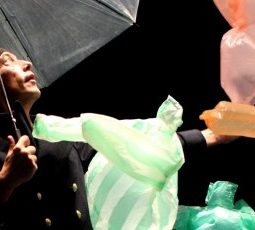
Review: No small part of what makes any season at Chicago Shakespeare Theater distinctive and intriguing is its annual bundle of imported shows. The visiting productions are often diminutive and typically off-beat, not just novel but beguilingly imaginative. Two such instances of theater writ small now occupy spaces at CST: “L’après-midi d’un foehn,” literally an air ballet of plastic shopping bags set to Debussy’s music, and “Us/Them,” the perspective of two children on a terrorist invasion of their school. ★★★/★★★
Lyric announces plans to crown ‘Ring’ cycle, begin Verdi series and tap into ‘42nd Street’
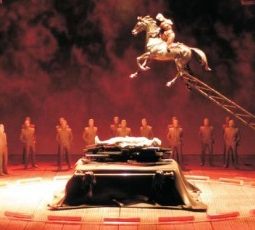
Preview: The consummation of a four-year project to produce Wagner’s “Ring” cycle and the beginning of a “five- or six-year” exploration of early Verdi highlight plans for the Lyric Opera of Chicago’s 2019-20 season, which also marks the 20th anniversary of Andrew Davis’ tenure as music director. After annual creations of Wagner’s “Das Rheingold,” “Die Walküre” and “Siegfried,” the Lyric will cap the “Ring” cycle with “Götterdämmerung” in April 2020, then pull the whole enterprise together with three turns through the complete tetralogy.
‘Between Riverside and Crazy’ at Redtwist:
Ex-cop, brash cop and a gritty deal on the line
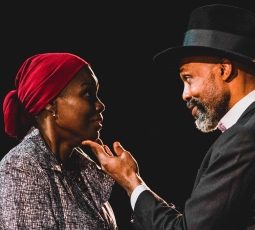
Review: Pops is a retired black New York cop – retired because he got thoroughly shot up by a fellow cop (white) while Pops was off-duty at an unsavory watering hole. But he gets along well enough in his rent-controlled Riverside Drive apartment, which he shares with a son who’s into some shady business and a slow-witted, adoring young ex-con. That’s the frame, the border around the stress points, of Stephen Adly Guirgis’ Pulizer Prize-winning play “Between Riverside and Crazy,” which enjoys a detailed, charged and mesmerizing go-round in the tiny arena that is Redtwist Theatre. ★★★★
Chicago theater mid-season preview, Part 2: Ahead at Porchlight, American Blues, Raven

Preview: Chicago’s turn into real winter comes with the consolation of intriguing theater just ahead. Think of it as warming countermeasures. Porchlight offers the musical farce “The Gentleman’s Guide to Love & Murder” while Raven plots Paula Vogel’s now-classic memory play “How I Learned to Drive.” American Blues jumps into the season’s second half with Steven Dietz’s “On Clover Road.” If a play synopsis that begins “At an abandoned motel on a desolate road” sounds more like a chiller, at least it will unfold in a snug place.
‘St. Nicholas’ at Goodman: Drama critic meets vampires. Seriously. He’s bloody amazed, too.
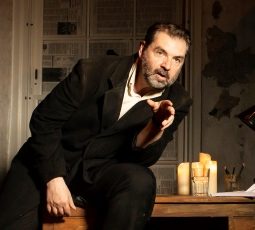
Review: It turns out vampires are real. Who knew? Anyway, the veracity of vampires is the central proposition of Conor McPherson’s one-man play “St. Nicholas,” now meandering across the boards at Goodman Theatre. I suspect the greatest allure of this dubious enterprise, brought to Chicago by London’s Donmar Warehouse, is the presence of Brendan Coyle – yes, the same Mr. Bates of “Downton Abbey” – as the nameless monologist. ★★
Chicago theater mid-season preview, Part 1: What’s in store at Goodman, Northlight, Steep

Preview: The Chicago theater scene enters its snow-to-blossoms segment with a flurry of highlights that we’ll glimpse in a three-part series of winter-spring previews. In early prospect are Goodman Theatre’s world premiere of Christina Anderson’s “How to Catch Creation,” Ike Holter’s “Red Rex” at Steep and Christina Ham’s “Nina Simone: Four Women” at Northlight.
Injured pianist Andsnes cancels Chicago date; Lars Vogt to sub with recital of Brahms, Bach

This Just In: The following is a news release written by an arts organization, submitted to and edited by Chicago On the Aisle.
The Symphony Center Presents Piano series announces that Lars Vogt will replace Leif …
‘The Lightning Thief’: An off-beat musical pits off-the-chart kids against all odds, and gods

Review: “The Lightning Thief,” a musical making a lightning pass through Chicago as the launch point of a national tour, is a charming, off-beat coming-of-age show. It’s something of a graphic novel for the stage – colorful, energetic, simpler than its busyness makes it seem. Still, in its benign fashion, “The Lightning Thief” proves agreeable enough, if a bit overwrought and underdone in the end. ★★★
Cellist Yo-Yo Ma to play complete Bach suites in free event presented by Chicago Symphony
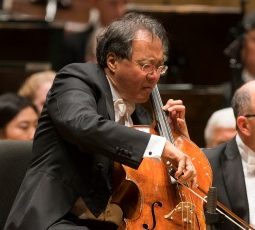
This Just In: The following is a news release written by an arts organization, submitted to and edited by Chicago On the Aisle.
Cellist Yo-Yo Ma will perform Bach’s suites for unaccompanied cello in a free …
Writers Theatre highlights 13th MLK Project with performance at Chicago History Museum
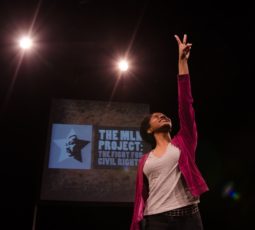
This Just In: The following is a news release written by an arts organization, submitted to and edited by Chicago On the Aisle.
Writers Theatre opens its 13th annual tour of The MLK Project: The Fight for Civil …
‘Year of Chicago Theatre’ celebrates enticing array of shows on area stages large and small
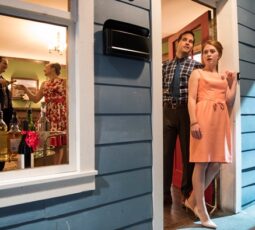
This Just In: The following is a news release written by an arts organization, submitted to and edited by Chicago On the Aisle.
The Chicago theatre community will ring in 2019 with major events, getting the …
TimeLine buys Uptown building for new home; $20 million project targets opening in fall 2021

This Just In: The following is a news release written by an arts organization, submitted to and edited by Chicago On the Aisle.
TimeLine Theatre has announced the purchase of a new home, the first step …
Old friend MTT leads CSO in a Russian thrilla, and an impressive Brit makes podium debut
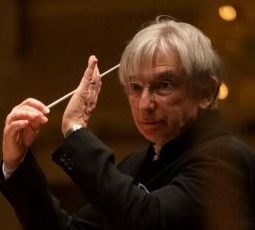
Review: A banner in the rotunda of Symphony Center proclaims coming concerts of “HOLIDAY CHEER,” in just such sizable letters, but the last two weeks of the Chicago Symphony’s classical subscription concerts – first under British conductor Edward Gardner and then Michael Tilson Thomas – have exuded a festive air of their own.
‘Il trovatore’ at the Lyric Opera of Chicago: Vital foursome re-energizes a Verdi classic

Review: When people talk about high-energy spectacle and romantic intensity in Italian opera, “Il Trovatore” is the classic Exhibit A. An instant hit when it opened in Rome, it’s still a winner. Lyric’s three-way production with the San Francisco Opera and the Met is a concept that remains dynamic and fresh, from the flash and wham of gypsy smithies hammering away at their swords in the extravagant Anvil Chorus, to the tragic love triangle that complicates a civil war unfolding. ★★★★
In jewel-box setting, Chicago Opera Theater polishes rare Tchaikovsky treasure ‘Iolanta’
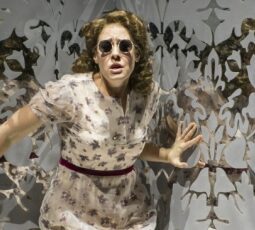
Review: It’s not often that you can pull a forgotten gem out of the trunk, showcase it in a tasteful setting, and reveal it for the magnificently neglected thing that it is. Chicago Opera Theater has succeeded in doing us that favor with Tchaikovsky’s dreamy, naturalistic 1892 opera “Iolanta” – the composer’s last – performed by able forces at the Studebaker, a lovingly refurbished 740-seat jewel-box on Michigan Avenue that also dates from that same last decade of the 19th century. ★★★
Maestro, father, grandfather: Muti dedicates CSO’s Verdi Requiem to massacre victims
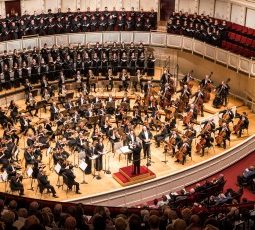
Review: In the aftermath of a California gunman’s rampage, the Chicago Symphony Orchestra and Chorus delivered heart-stirring performance, resplendent with awe and penitence, delicately threaded with human doubt, and led by the world’s finest living interpreter of this work.
‘Siegfried’ at Lyric Opera: Amid witty optics, short-pants hero meets gravitas of Eric Owens
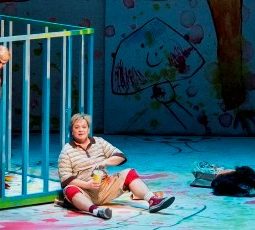
Review: The first sign of the enemy in “Siegfried” was a shiny-red three-toed claw, beckoning from under Lyric Opera curtain, as if to say, “I’m Fafner the Dragon, and I’m ready to rumble.” The crowd rippled with mirth and stayed on top of the details in Wagner’s lively saga about the great god Wotan, played by bass-baritone Eric Owens, and the brash young Siegfried, whose help is needed if Wotan’s plan to save the gods has half a chance. ★★★
After 12-year absence from CSO, Barenboim returns with ‘My Homeland’ – but not his own

Review: No living conductor, not even music director Riccardo Muti, enjoys a longer association with the Chicago Symphony Orchestra than Daniel Barenboim. It was 48 years ago this month that the Israeli musical polymath, then all of 28, led the CSO for the first time. Barenboim would become the CSO’s music director in 1991 and hold that post until 2006. On Nov. 1, for the first time in the 12 years since he stepped down, Barenboim returned to conduct the CSO in the six symphonic poems of Smetana’s “Má vlast” (My Homeland), a reading more attuned to virtuosic effect than to the work’s essential Bohemian nationalism.
‘Radio Culture’ at TUTA Theatre: Conjuring day in the ‘normal life’ of a young Berlarusian
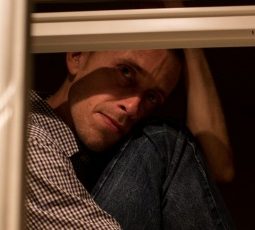
Review: TUTA Theatre Company has forged its reputation by introducing audiences to unusual theatrical fare drawn largely from Eastern and Western European playwrights. The company has been more or less itinerant. But for the next month or so, if you venture into its newest, tiny (25-seat) storefront in a hidden corner of the Ravenswood neighborhood, you will spend 70 absolutely riveting minutes experiencing the U.S. premiere of Maxim Dosko’s “Radio Culture.” ★★★★
Haitink takes a misstep on the CSO podium, but not in grand turn through Bruckner Sixth

Review: Amid a roaring ovation for his eloquent account of Bruckner’s Sixth Symphony with the Chicago Symphony Orchestra, 89-year-old Bernard Haitink lost his footing on the step at the side of the podium and doubled over onto the Orchestra Hall stage. In an instant, the audience’s elation turned to a mass gasp of horror. But minutes later, the venerable maestro was gesturing to the relieved players and cheering public to assure them that all was well.
Recent Posts
- In concerts brilliant and grand, Muti showed
why he still waves magic wand over the CSO - CSO finale’s convergence of three young stars signaled new energy heading into Mäkelä era
- Mäkelä, CSO’s maestro-elect, shows his chops with baton and bow in Oslo orchestra concerts
- Haymarket Opera closes out its spring season with early Handel oratorio ‘La Resurrezione’
- In concerto ‘The Elements,’ CSO and violinist mined the potential of composer partnerships
Most Commented
- Role Playing: Janet Ulrich Brooks on nailing the style of a wily Russian in 'A Walk in the Woods'
- Role Playing: City boy Michael Stegall ropes wild cowboy in Raven Theatre’s ‘Bus Stop’
- Role Playing: Sadieh Rifai zips among seven characters in one-woman ‘Amish Project’
- Role Playing: Kirsten Fitzgerald inhabits sorrow, surfs the laughs in ‘Clybourne Park’
- Role Playing: Brent Barrett’s glad he joined ‘Follies’ as that womanizing, empty cad Ben

